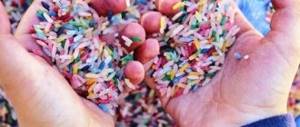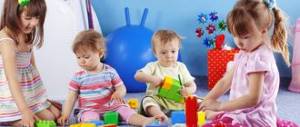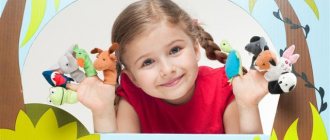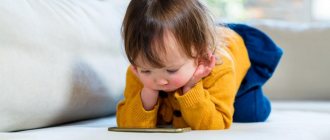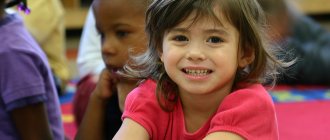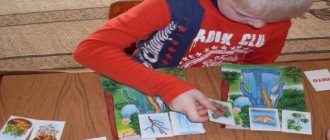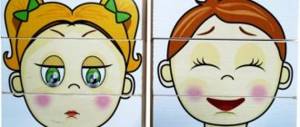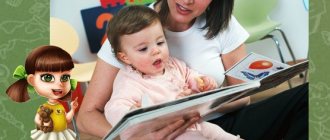A good father is an attentive, sensitive, caring and delicate friend of the child.
Preliminary work for the conference: arrange an exhibition of children’s drawings “A day off with dad” and an exhibition of crafts; preliminary conversations with dads regarding the issue of speaking.
Social teacher. Recently, teachers and parents have been alarmed by the fact that it is mainly mothers who are raising children. How is it that the role of the father in most families is reduced to zero? Why very often does a child not find in his father not only his ideal, but also simply a kind and warm friend? And is this not why he looks for this ideal in other people, who do not always meet the best human qualities?
Our parent conference today, I hope, will help awaken the best masculine and paternal qualities in our parents. There are fathers here who want to share their experiences in raising children.
Speech by fathers.
Report of a social teacher
Fatherhood is the most wonderful thing that most men experience, because they feel themselves in a new capacity, becoming more open.
“Mother’s love protects the baby more, father’s love develops him more; the mother’s nurtures the soul, the father’s – strength and intelligence. Their strengths complement each other well. And ideally, these two one-sided loves can form a very balanced couple, they can create psychological comfort in which it is good for a child to grow up...” (Yu. Rurikov).
Nowadays, the role of the father has changed significantly.
The father begins to take care of his child even before birth, applying patience, strength and skill. Fathers have an incredible amount to give to their children psychologically, socially, emotionally and physically. There is a direct connection between the father's influence on the child and the child's high IQ. In father's pedagogy, one can highlight the instillation of a sense of duty to relatives, hard work, strength, endurance, and courage.
Psychologists believe that a father can be an excellent teacher of his children, because he has a rich supply of information.
The masculine principle in education is justice, objectivity, restraint, thanks to which the child develops intelligence, logic, camaraderie, and the ability to stand up for himself and others.
Fatherhood is a powerful stimulus for personal development. In a family where the father treats the mother with love and sympathy, where the husband and wife jointly make decisions about everyday affairs, this relationship, love and understanding is transferred to the children, a child in such a family shows more care for his parents than a child who does not knows his father's example, does not feel his care and love. After all, not every man understands his role in raising a child; some isolate themselves from family life, from children, continuing to lead their lifestyle, satisfying only their whims and desires.
Such fathers create a nervous environment in the family, which the baby perceives very sensitively, becoming irritable, nervous, and sometimes aggressive. So the father, not understanding and not feeling this, becomes an enemy to his child.
Parent conference “Successful Parents. Happy children."
Author: Agapitova Rosalia Aglyamovna
Parent conference
“Successful parents. Happy children."
SLIDE No. 1
.
Good evening, dear caring loving parents.
I would like to start my speech with a poem that a child wrote:
SLIDE No. 2.
"In the family circle"
You and I are growing up in a family circle. The foundation is the parental home. All your roots are in the family circle, And you enter life from the family. In the family circle we create life, the basis of the foundation is the parental home.
The main idea is clear... The problem of communication in our age of modernization and computerization arises most acutely. Lively, emotional, direct communication in the family fades into the background. Parents have to spend a lot of time ensuring the material well-being of their family; children are often left to their own devices and organize their leisure time at their own discretion, namely, they are busy playing computer games, watching cartoons, TV series...
SLIDE No. 3.
“Problem”, “difficult”, “disobedient”, “impossible” children, as well as children “with complexes”, “downtrodden” or “unhappy” are always the result of incorrectly developed emotional relationships in the family.
In accordance with the new requirements of the Federal State Educational Standard, one of the areas of child development in a preschool educational institution is social and personal. A child’s communication affects the following educational areas: communication and socialization. The speech therapist told us well about communication... And I will focus on the role of socialization. So, what does this definition mean:
SLIDE No. 4
"Socialization"
- this is the process of a child’s assimilation of social norms and cultural values of the society to which he belongs. In the process of socialization, the child’s personality is formed, stable character traits and life values are laid.
SLIDE No. 5
The socialization of the child occurs through: family (parents), peers and society with which the child, one way or another, comes into contact.
SLIDE No. 6.
FAMILY
T.V. Andreeva (domestic psychologist) believes that “the family and the child are a mirror image of each other. As a result, it is in the family that those qualities are formed that cannot be formed anywhere else.”
SLIDE No. 7.
First of all, do not forget about etiquette
communication.
Keep in mind that it is necessary to teach your child to thank
an adult and peer for the help and attention provided, to use
the words
“thank you,” “please,” “sorry,” “good afternoon”;
share
toys, express your
request
(that is, the child must ask adults or peers for something)
,
address other people
by name
. The child must understand what can be done and said and what cannot be done. It is also necessary to establish clear boundaries of what is permitted, to define the boundaries of acceptable and unacceptable behavior.
SLIDE No. 8.
It's good when each family member has certain responsibilities
around the house, accurate and clear for every day, or week, month. The child will have a sense of stability. Let the child help you first at the level of play, when the child likes the task, this way the child is involved in natural housework, and not under force (cleaning toys, watering flowers, wiping dust, vacuuming, feeding a pet, cooking together; duty, connected with society - go to the store, help choose purchases...). By helping parents, the child feels important and useful.
Don’t forget, of course, about visiting people, as well as inviting guests to your place. This teaches skills to behave both as a host and as a guest.
SLIDE No. 9.
Friendly emotional relationships
in a family - the key to mutual understanding between its members. They should not be associated with some kind of self-interest, but should be unconditional, they are not subject to bargaining. One day a little girl asked: “Mom, why do you love me?” Mom began to list why exactly: that you help me around the house, that you are obedient... The girl thought about it and said: “Yes? And I love you just like that!”
We all love our children. But often we don’t know how to express it. Let's start with the little things: in the morning
you approach the child and, regardless of his age, quietly wake him up, look at him tenderly and speak kindly to him. This start of the day is very important for a child. After all, a difficult life awaits him outside the walls of the house. It is important that he leaves home calm, with an emotional reserve of your love. It would be great if the family started such a ritual: with a smile, looking into the eyes, see off the departing child of the husband, wife... touch the child as often as possible. While children are small, they are still drawn to you, they still need your affection, rejoice in this and take advantage of it, since a teenager will not climb onto your lap and hug you. American psychologist Virginia Satir made a discovery - for a person’s emotional well-being, he needs 40 hugs a day. If a child was not stroked, rocked, carried in his arms, looked into his eyes with love and tenderness, or taught to express his feelings, then there is no point in expecting him to respond in kind. ("Unexpected Child" Syndrome)
SLIDE No. 10.
Second point. When it is extremely important to show your love - this is in the evening,
before bedtime. Make it a rule: 5 minutes before bed is sacred time, that very web of love that stretches from you to your child and nourishes his soul. The child should go to sleep calm and peaceful. He needs someone to just sit with him, stroke him, kiss him, and have a heart-to-heart talk. Listen carefully to the child, everything he tells is serious and significant for him.
So, eye contact, physical touch, and the ability to actively listen should be instilled in a person from a very early age.
SLIDE No. 11.
How does a child’s socialization occur through connections with society?
Preschoolers begin to identify their “I” and separately “Society” around the age of six.
What is important is how the child becomes acquainted with society. It is necessary for the child to be not only an observer, but a direct participant (himself, personally doing something). The child must know the purpose of organizations, how to behave properly there, and who to turn to for help if necessary.
The very first institution in a child’s life is, of course, a hospital
and those who work there - doctors, nurses, orderlies. There is an acquaintance with professions - each has its own specific role, who does what, what work they do, what they are responsible for.
How does the child’s further acquaintance with society take place, through which organizations?
-Store (for selling food, clothing and other items)
— Kindergarten (what is it for, who works there)
-Barbershop (doing haircuts, hairstyles)
-Bus, train, plane, ship, everything related to travel, movement
-Circus, theater (watch performances, performances),
— Library (choose books to read),
— Planetarium (an institution that has telescopes, a copy of the sky with artificial luminaries)
— Skating rink, stadium (place for sports games)
-Sberbank (make cash deposits, pay utility bills)
— Mail (sends letters, parcels)
— Dry cleaning (clean carpets, clothes, pillows)
And other institutions.
The child will gradually learn to understand the structure of society, what place he, his parents, grandparents, etc. occupy there. What profession do his parents work in, what benefit do they bring to society?
Conclusion: during this period it is important not only to introduce him to the surrounding society, but also to make the child a full member and participant.
SLIDE No. 12
Interaction with peers.
Observe how the child behaves in everyday situations, how he plays with others, what he does when strangers appear in the house? What games he prefers to play is important how he voices dialogue with toys. What does the kindergarten teacher tell you about him? Psychologists have noticed that children with communication problems are afraid to look into the eyes of their interlocutor, react painfully to the words of others, often have habits such as biting nails, involuntary twitching of the head, shoulders or other parts of the body, prefer to play alone, and play guided roles.
Almost every child at certain points in his life experiences some difficulties related to communication. After 2 years, children can be taken to clubs or clubs that are organized specifically for children of this age. This also prepares you for being in society and working together, and gives you primary communication skills in a team. Until a child is 3 years old, he does not need peers. During this period, “side by side” games are typical for children, that is, object-manipulative activity predominates in children. Around this age, the “3-year-old crisis” occurs (key words “I myself”), which can also have a negative impact on communication. By playing together, children begin to build their relationships, learn to communicate, not always smoothly and peacefully, but this is the path of learning, there is no other way.
SLIDE No. 13.
The preschool educational institution graduate model looks like this:
· The child is emotionally responsive, knows how to express emotional states: joy, sadness, resentment, anger, surprise, etc. and knows how to “read” them from others.
· Accepts others and has a positive attitude towards himself.
· Able to manage one’s own behavior. Knows constructive ways of communication. Complies with generally accepted norms and rules.
Conclusion: the child’s accumulation of the necessary social experience independently and under the guidance of adults contributes to the development of the preschooler’s age-related potential, successful preparation for school, and later successful adaptation to a changing society in adulthood.
I would like to end my speech with a parable:
“A young woman came to the sage for advice.
-Sage, my baby is one month old. How should I raise my child: in severity or in affection?
The sage took the woman and led her to the vine:
-Look at this vine. If you don’t prune it, if, sparing the vine, you don’t tear off its extra shoots, then the vine will go wild. If you lose control over the growth of the vine, you will not get sweet, tasty berries. But if you protect the vine from the sun and its caress, if you don’t carefully water the roots of the vine, then it will wither and you won’t get sweet, tasty berries... Only with a reasonable combination of both can you grow amazing fruits and taste their sweetness!”
SLIDE No. 14.
Bringing goodness, love, affection to children and demanding
compliance with certain norms and rules, we will lay in them everything that is bright and pure with which they will live their future lives.
As a guide to action, we can cite the words of Vera Semyonovna Mukhina: “Let childhood happen, let childhood play out, teach preschool children not to read and write, but to THINK, REASON, SPEAK!”
A child should be a child, don’t rush him to become an adult.
Don't take away your children's childhood!
Be not next to them, but with them!
SLIDE No. 15.
Thank you for your attention.
comments powered by HyperComments
Family relationships leave a huge mark on a child’s behavior and affect his character.
A child’s whole life is a desire to be like their parents. Respectful treatment of him in the family, parental warmth and goodwill instill in him gratitude, tenderness and appreciation for life. A good father is an attentive, sensitive, caring and delicate friend of the child.
Report of the Deputy Head for Main Activities
A good father is a teacher of both his son and daughter.
Raising a daughter is not necessarily the mother’s job. A good relationship between a daughter and a father opens the way to success in life. If the father showed attention to his daughter’s beauty, neatness, hard work, and became interested in her affairs, the girl will have an easy start in life. In Eastern philosophies, fatherly love is compared to the rays of the sun, to which everyone on earth owes their life.
A boy who was raised by both his mother and father grows up strong, morally healthy and resilient.
Where, if not from his father's example, can he learn to be a man?
Only a father can show how a man acts, teach him to respect and love a woman, mother, wife.
The father plays a very important role in the sex education of his son and daughter. Already in the first months of a child’s life, he plays differently with a boy and a girl, thereby beginning to form gender identification. It is the father who can help his son understand the incomprehensible, give him the necessary knowledge in the field of physiology and hygiene, and teach him the rules of etiquette in relations with girls.
When raising their daughters, dads need to be on their guard and not use “masculine” parenting methods, because this often leads to a negative result: dad wants to make his daughter strong, self-confident, but she grows up to be a cold, callous egoist, tries to raise her to be courageous - she starts smoking and starts drinking alcohol.
CHILDHOOD GUIDE
In accordance with the Federal State Educational Standard for Educational Education, one of the conditions necessary for creating a social situation for the development of children is the direct involvement of parents in educational activities and support for family educational initiatives .
An effective form of implementing this condition can be considered a parent conference. This is an event where parents share their experiences in raising and educating children. Teachers also speak at the conference, where they explain the topic of the conference from a professional point of view.
Objectives of the parent conference:
- Creating conditions for person-oriented communication with parents.
- Familiarization with pedagogical experience in the upbringing, training and development of a child in the family.
- Involving the family in a single educational space of a preschool institution.
- Establishing trusting, partnership relations between teachers and parents.
In this article we will consider this event as one of the methodological directions in the activities of a senior educator.
In this case, it is advisable to take one of the annual tasks of the preschool educational institution as the topic of the conference. Then start preparing for the conference.
The algorithm of actions is something like this:
- Educators conduct surveys and individual conversations with parents in order to familiarize themselves with family traditions, features of family education, forms of interaction between parents and children, etc.
- Based on the results of the survey, as well as in the process of discussion with group teachers and specialists, it is necessary to identify the best pedagogical examples of family education of children who attend preschool educational institutions.
- Then it is important to help parents in formatting the content of the speech and in developing a multimedia presentation. If mom or dad are embarrassed to speak, then the teacher can read the text himself, and at this time let the parent stand nearby and press the computer buttons, showing the presentation)))
- It is advisable to invite television or newspaper journalists to report on this event. After all, this is a great opportunity to record the results of the activities of preschool teachers and improve the image of your institution!
- After the conference, I recommend publishing a collection of speeches by parents and teachers. There is no need to send materials to the printing house. It is enough to make a small A5 book yourself.
- In each group , create a photo album or stand with photographs of parents and children in a family setting.
By and large, the conference and related events can be turned into an educational project !
I foresee objections from my colleagues that this is a very difficult event to prepare and wastes time and energy. Yes it is.
But there are more advantages!
Firstly, each teacher will write in their reports (application) for certification that they used an active form of interaction with parents and provided psychological and pedagogical support in preparing and jointly holding the conference.
You can even organize a creative group to prepare for the conference. (Participation in a creative group is welcome and counts towards certification).
Secondly, the senior teacher will write that:
— improved the methods of pedagogical education of parents;
— developed professionally significant competencies among teachers necessary to solve problems of effective interaction with parents;
— the parents gained experience of active participation in the educational process of the preschool educational institution, enriched their knowledge about the activities of the preschool institution that the child attends.
Well, and of course - this is gratitude and respect for parents, the establishment not on paper, but in reality, of partnerships and friendly relationships. Both children and adults will benefit from this!
Dear teachers! If you have questions about the topic of the article or have difficulties in working in this area, then write in the comments . I'll definitely help.
Golovina Bela Gennadievna, site administrator, Candidate of Pedagogical Sciences
Features of interaction between the music director and the parents of pupils in the CIPR Project activity as a form of cooperation with parents Creation of an effective system of interaction with parents as a means of updating the educational process in preschool educational institutions Mini-museum in kindergarten as a form of partnership interaction with families of pupils >
My family traditions
Parent conference at the preschool educational institution.
One of the tasks of our kindergarten is to promote the development and strengthening of the family as a social institution by involving parents in cooperation and participation in raising children.
Tasks:
- promote the observance of existing family traditions and the emergence of new ones;
promote the exchange of experience in family education and traditions;- improve the pedagogical culture of parents;
- look for new forms of interaction between teachers and parents.
Materials and equipment:
A4 sheet with a family tree, pencils, scissors, silhouette of a lamb made of cardboard, glue pencil, woolen threads, napkins; musical accompaniment; threads and ribbons for games, prizes for each child; scarves for the game "Yurt".
Progress of the event
(Families are invited to the music room; each family has a separate table.)
Leading:
Dear parents! Today we have gathered to talk about family, family traditions and their importance in the upbringing and development of a preschool child. Before starting our conversation, I offer you a warm-up “What do we know about the family.”
What is the Latin word for "family". (Surname.)
Now say “family” in Italian. (Mafia.)
As you know, the Greek goddess Athena was the goddess of wisdom, and the owl was considered her bird. But the goddess Hera, the wife of Zeus, was considered the patroness of family and motherhood. Guess which bird was considered the “bird of Hera”? (Stork.)
What is the Russian “fruit” proverb about someone who has inherited bad, unseemly behavior from their father or mother? ("The apple never falls far from the tree".)
What Russian toy is this quote from the encyclopedia about: “It personifies the idea of a strong family, prosperity, procreation, and carries the idea of unity”? (About the nesting doll.)
Leading:
Dear parents!
How do you calculate who has the leading role in raising a child – the family or the kindergarten? (Answers from parents.)
The priority in raising a child undoubtedly belongs to the family.
What do you think the word “family” means? (Answers.)
For a long time, home and family have always been spoken of with love and respect. Legends, fairy tales, proverbs and sayings about family have come down to us from ancient times. Let's try to remember them.
Being a guest is good, but being at home is better).
The hut is not red in its corners, but... (red in its pies).
As it is at home, so is it... (yourself).
Children are not a burden, but... (a joy).
When the family is together and... (heart in the right place).
Leading:
The moral health of a family, its spiritual values and, consequently, its potential educational capabilities can be judged by the traditions established in it. I invite you to answer the questions now.
What do you think is included in the concept of “family traditions”?
What family traditions do you have in your family?
Do family traditions influence the upbringing of a child?
What positive character traits do they foster in a child? (Parents' answers.)
Leading:
So let's look at our traditions. One of the traditions of every family is celebrating a birthday.
child.
And what is a holiday without a gift and surprise? Now we propose to play the “Choose a Gift” game. ( A rope is stretched across the room and gifts wrapped in paper are hung on it. The child’s eyes are closed, untwisted, and he must cut off some gift with scissors.)
Presenter:
Another tradition is compiling a family tree.
We suggest now compiling a pedigree for your family. Start with your children. (Leaflets with a picture of a family tree are distributed, and the participants in the parent conference write down their pedigree, time to complete the task is 5 minutes.)
Presenter:
Who had the most numerous clan? Do you know where your parents and grandparents are from? Who came up with the name you have?
Leading:
Look, our hall is decorated with photographs from family albums. Unfortunately, in the modern computer world, this tradition is receding more and more into the background. But, however, the selection of photographs, the design of album pages is exactly the communication that a child needs in his joint activities with his parents. In addition, memorial certificates and documents about achievements can be placed in the album - a family archive.
Leading:
Another good tradition is playing with your child. Play is a child’s life, not preparation for life. There are a lot of games and toys. You should carefully and thoughtfully approach their selection.
Role-playing game:
the main type of games for preschoolers. During this game, the child tries on various social roles, puts himself in social situations that he could see in the real life of adults.
Outdoor games:
Children are very active and restless, which is why outdoor games are so important. In them, children can realize their need for movement, improve their motor skills and abilities, and develop such physical qualities as speed, agility, and strength.
Folk games:
help maintain cultural traditions and connections between generations. We invite you to play with us one of the Bashkir folk games “Yurt”.
The game involves four subgroups of children, each of which forms a circle at the corners of the site. In the center of each circle there is a chair on which a scarf with a national pattern is hung. Holding hands, everyone walks in four circles at alternating steps and sings:
We are funny guys
Let's all gather in a circle,
Let's play and dance
And let's rush to the meadow.
At the end of the music, they quickly run to their chairs, take a scarf and pull it over their heads in the form of a tent (roof), it turns out to be a yurt. The first group of children to build a yurt wins.
Leading:
Family meals are also a wonderful tradition.
You can communicate at the table on any topic - discuss news, events of the day. The benefits of family dinners together are enormous. Firstly, it is helping children acquire language. Secondly, such family dinners provide a sense of family cohesion. And, of course, a family dinner is an occasion for your favorite dishes! Now each family will share their signature dishes. (Discussion.)
And we also have our own tradition - to end any event with tea. And today we will not violate it. After all, our parents prepared sweet dishes.
Gulnara Gaffanova, teacher, Liliya Fayzullina, teacher,
Olga Nikiforova, senior teacher
MBDOU D/s No. 59 Salavat rep. Bashkortostan
